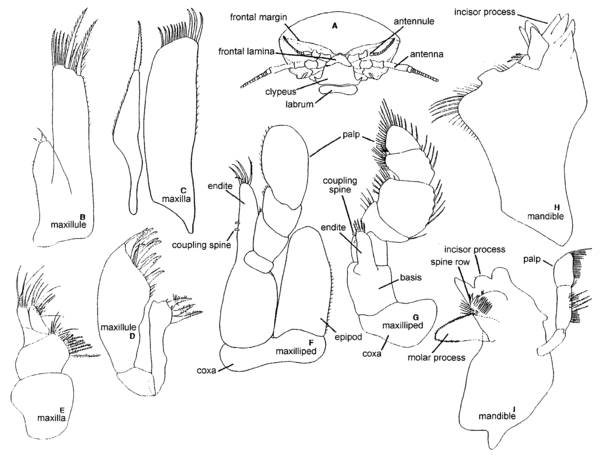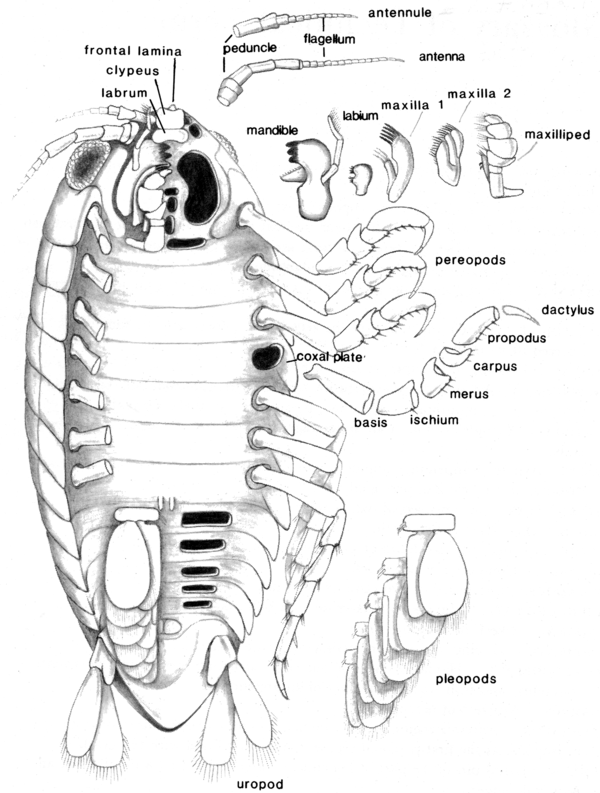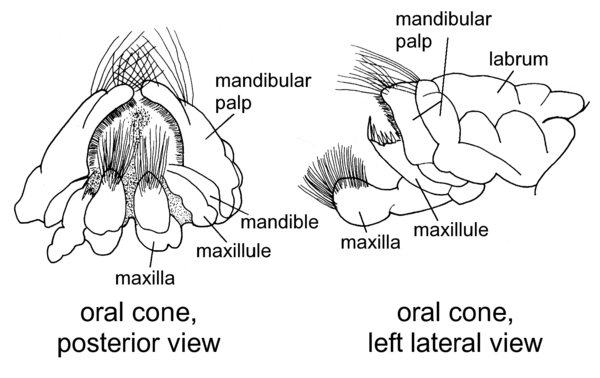A bulbous structure lying next to the epistome and bordering the anterior margin of the oral opening. (Syn. upper lip) [Holdich and Jones, 1983].
An unpaired, flat segment of the cephalon that articulates with the clypeus, and anteriorly covers the mandibles [Wilson, 1989].
Unpaired outgrowth arising just in front of mouth and more or less covering it. (Syn. upper lip) [Moore and McCormick, 1969].
Unpaired outgrowth arising just in front of mouth and often more or less covering it. (Syn. upper lip) [McLaughlin, 1980].
Upper lip or unpaired structure arising anterior to the mouth and often covering it [Perez Farfante and Kensley, 1997].
(Order Cladocera):
Relatively large, unpaired lobe covering mouth. Distal ends of mandibles extend under labrum. (ventral edge: smooth, toothed). (Syn. upper lip) [Stachowitsch, 1992].
(Order Notostraca):
Large, unpaired lobe covering mouth and extending over end of mandibles. (Syn. upper lip) [Stachowitsch, 1992].
(Order Diplostraca):
Relatively large, unpaired lobe covering mouth; free (posterior) margin bears prominent spine. Tips (molar processes) of mandibles extend into preoral cavity (atrium oris) under labrum. (Syn. upper lip) [Stachowitsch, 1992].
(Order Anostraca):
Large, bulbous, unpaired lobe covering mouth and extending over end of mandibles (with/without knob-like protuberance). (Syn. upper lip) [Stachowitsch, 1992].
(Class Cephalocarida):
Large, bulbous, unpaired lobe covering mouth and extending over end (molar and incisor processes) of mandibles and to a lesser extend over maxillules. Preoral cavity formed under labrum is termed atrium oris. Anterior end of labrum may be associated with "eyes." (narrowly or broadly rounded anteriorly and posteriorly, somewhat pointed anteriorly and posteriorly; oval, obovate). (Syn. upper lip) [Stachowitsch, 1992].
(Order Cumacea):
Unpaired, lobe-like structure anterior to mouth; adjoins bases of antennules and antennae. (See also labium). (Syn. upper lip) [Stachowitsch, 1992].
(Order Tanaidacea):
Unpaired, lobe-like structure an-erior to mouth. Adjoined anteriorly by clypeus. (Syn. upper lip) [Stachowitsch, 1992].
(Order Decapoda):
Relatively large, unpaired, fleshy lobe in front of and partially covering mouth; adjoined anteriorly by epistome. (Syn. upper lip) [Stachowitsch, 1992].
(Order Amphipoda):
Unpaired, lobe-like structure anterior to and partially covering mouth, (rounded, medially incised = apically notched = bilobed; lobes: symmetrical/ asymmetrical). (Syn. upper lip) [Stachowitsch, 1992].
(Order Isopoda):
Flaplike structure posterior to and borne upon the frontal lamina or clypeus, usually free but occasionally fused to the head; the "upper lip" (see clypeus) [Wetzer et al. 1997].
( )
)
 )
)Nomenclature of isopod cephalon (A). Examples of isopod mouth appendages: Idoteidae (B, C, F, H); Cirolanidae (D, E, G, I). [Wetzer et al. 1997]
(Order Isopoda):
Unpaired projection anterior to mouth, attached to the clypeus; upper lip [Kensley and Schotte, 1989].
( )
)
 )
)Schematic representation of an isopod illustrating morphological terms. [Kensley and Schotte, 1989]
(Order Isopoda):
Unpaired, lobe-like structure anterior to and partially covering mouth. (Syn. upper lip, frontal lip) [Stachowitsch, 1992].
(Order Mysida):
Unpaired, helmet-shaped structure anterior to mouth; extends posteriorly, covering mouth and part of mandibles. (bilobate, entire, with/without anterior spiniform projection). (Syn. upper lip) [Stachowitsch, 1992].
(Order Stomatopoda):
Relatively small, unpaired fleshy lobe in front of mouth; adjoined anteriorly and laterally by epistome. (Syn. upper lip) [Stachowitsch, 1992].
(Order Leptostraca):
Unpaired lobe-like structure anterior to and partially covering mouth. (Syn. upper lip) [Stachowitsch, 1992].
(Subclass Branchiura):
Lip-like structure in front of mouth; either consists of fleshy, papilla-shaped elevation or is reduced, along with paragnaths, to serrate flap enclosed in proboscis. (Syn. upper lip) [Stachowitsch, 1992].
(Subclass Cirripedia):
( ) [Anderson, 1980].
) [Anderson, 1980].
 ) [Anderson, 1980].
) [Anderson, 1980].Balanus trigonus: oral cone, posterior view; and oral cone, lefft lateral view. [Anderson, 1980]
(Subclass Cirripedia):
Unpaired lobe covering mouth; typically bear pair of palps. Forms part of oral pyramid in ascothoracican. (bullate, not bullate; cutting edge: straight, concave, with median notch; with/without setae or spines). (Syn. upper lip) [Stachowitsch, 1992].
(Subclass Copepoda):
A lobe-like flap originating near the anterior margin of the head, between the bases of the antenna 1, and extending posteriorly across the ventral surface of the body to the mouth area [Ferrari and Dahms, in press].
(Subclass Copepoda):
The upper lip; a posteroventrally-directed, muscular, median lobe forming the anterior wall of the oral cone [Boxshall and Halsey, 2004].
(Subclass Copepoda):
Unpaired, lip-like structure in front of mouth. May cover basal part (gnathobase) of mandible or be drawn out, along with lower lip (labium), into cone-like structure (mouth cone). (Syn. upper lip) [Stachowitsch, 1992].
(Subclass Mystacocarida):
Large, bulbous, unpaired lobe covering mouth. Contains large gland and labral ganglion and extends over gnathobases of mandibles. (distal = posterior end: gradually expanded, abruptly expanded). (Syn. upper lip) [Stachowitsch, 1992].
(Class Ostracoda):
Unpaired, lip-like structure in front of mouth. May contain salivary glands or glands which produce a luminescent secretion. (Syn. upper lip) [Stachowitsch, 1992].
(Class Remipedia):
Relatively large, fleshy lobe anterior to mouth; divided by transverse furrow into subtriangular anterior part and bulbous posterior part, the latter with a fossa and dense array of ribbon setae on posterior margin. Projecting posterior margin forms atrium oris below and extending somewhat behind true mouth [Stachowitsch, 1992].
(Superorder Syncarida):
(Order Euphausiacea):
Unpaired, lobe-like structure anterior to and partially covering mouth. (Syn. upper lip) [Stachowitsch, 1992].
Crustacea glossary. Natural History Museum of Los Angeles County. 2011.